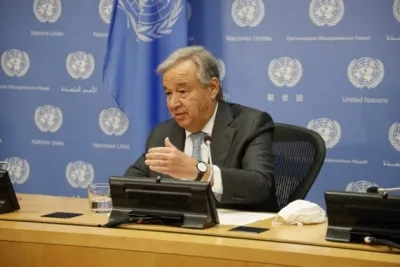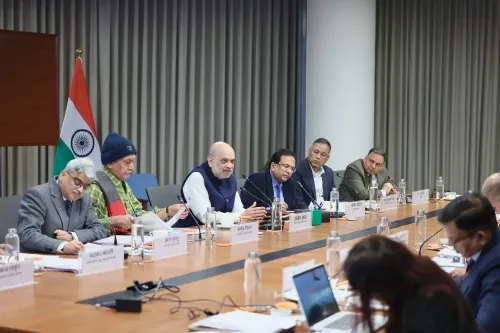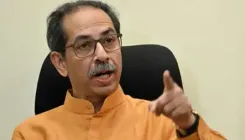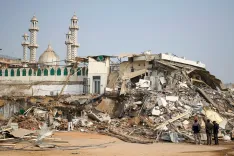Should Pahalgam Terrorists Be Brought to Justice?
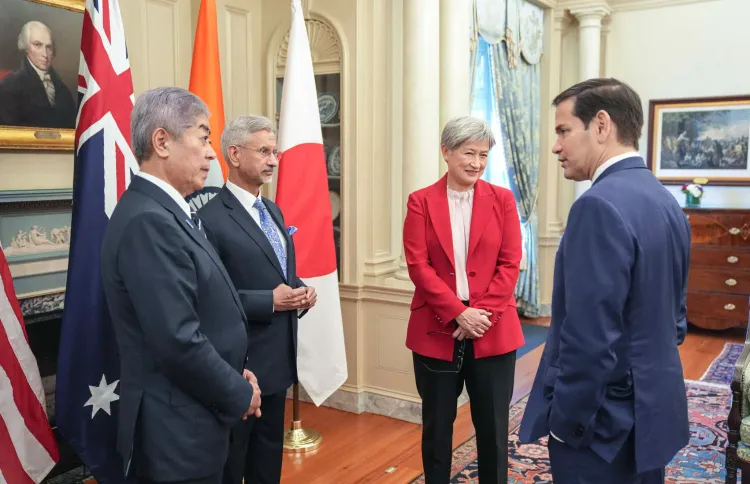
Synopsis
Key Takeaways
- Quad ministers demand justice for Pahalgam attack perpetrators.
- Commitment to counterterrorism cooperation emphasized.
- Launch of Quad Ports of the Future Partnership announced.
- Quad Critical Minerals Initiative to enhance economic security.
- Plans for natural disaster relief training exercise revealed.
Washington, July 2 (NationPress) - Renewing their commitment to combat terrorism, the Quad foreign ministers have called for the immediate prosecution of those accountable for the “deplorable” Pahalgam attack and urged the involved nations to collaborate with the authorities.
In a joint statement released after their Tuesday meeting, they stated, “We urge that the perpetrators, organizers, and financiers of this reprehensible act be held accountable without delay and call upon all UN Member States to actively support relevant authorities, adhering to their obligations under international law and pertinent UNSCRs (Security Council Resolutions).”
“The Quad unequivocally condemns all forms of terrorism and violent extremism, including cross-border terrorism, and reaffirms our commitment to counterterrorism efforts,” the statement added.
External Affairs Minister (EAM) S. Jaishankar, US Secretary of State Marco Rubio, Australia’s Foreign Minister Penny Wong, and Japan’s Foreign Minister Takeshi Iwaya convened for their second ministerial meeting of the year, representing major democracies in the Indo-Pacific region.
They expressed their strong condemnation of the terrorist attack in Pahalgam, Jammu and Kashmir, on April 22, 2025, which resulted in the deaths of 25 Indian nationals and one Nepali citizen, injuring numerous others.
While the statement did not specify any countries, the identity of the nation was evident, as The Resistance Front, which executed the attack, is affiliated with Lashkar-e-Taiba, known to be harbored by Pakistan.
Prior to the meeting, Jaishankar stated, “India has every right to defend its citizens from terrorism, and we will exercise that right.”
“We anticipate our Quad partners to understand and appreciate this,” he emphasized.
The top diplomats expressed eagerness for the upcoming Quad summit, hosted later this year by Prime Minister Narendra Modi, which is expected to be attended by US President Donald Trump, Prime Minister Anthony Albanese of Australia, and Prime Minister Shigeru Ishiba of Japan.
They noted plans to initiate the Quad Ports of the Future Partnership in Mumbai this year.
To ensure the Quad's lasting influence, the ministers outlined a new, ambitious agenda focused on four critical areas aimed at enhancing the Quad's capacity to tackle the region's most urgent challenges.
The four focus areas include maritime and transnational security, economic prosperity and security, critical and emerging technology, and humanitarian assistance and emergency response.
While their joint statement highlighted concerns over threats posed by the use of force and coercion by China, they refrained from explicitly naming it.
“We remain genuinely concerned about the situation in the East China Sea and South China Sea,” the statement remarked, detailing various actions that include “unilateral actions that seek to alter the status quo through force or coercion... dangerous and provocative actions, including interference with offshore resource development, repeated obstruction of navigation and overflight freedoms, and perilous maneuvers by military aircraft and coast guard vessels.”
Though China was not directly mentioned, it has undertaken these actions against the Philippines, Vietnam, and South Korea, and it has been involved in conflicts with Malaysia over offshore oil drilling.
“These actions jeopardize peace and stability in the region,” they asserted. “We are seriously troubled by the militarization of disputed territories.”
The ministers voiced concerns over supply chain disruptions, particularly regarding critical minerals, emphasizing the necessity to diversify supplies.
In a concrete step to address this challenge, they announced the launch of the Quad Critical Minerals Initiative, aimed at strengthening economic security and collective resilience by collaborating to secure and diversify critical minerals supply chains.
To enhance the Quad's capability to respond to natural disasters—a mission that initially shaped the group—the ministers indicated plans for the first Quad Indo-Pacific Logistics Network field training exercise this year.
It aims to “bolster shared airlift capacity and leverage our collective logistics strengths to respond more swiftly and efficiently to natural disasters, providing support for regional partners,” the statement added.
The Quad ministers condemned North Korea's missile and nuclear weapons programs, demanding compliance with United Nations Security Council resolutions to cease these activities.
They also expressed “grave concern” over North Korea's malicious cyber activities, including cryptocurrency theft and the employment of workers abroad to finance its unlawful weapons of mass destruction and ballistic missile initiatives.
North Korea has reportedly dispatched its citizens to fight on behalf of Russia in Ukraine.
On a regional note, the ministers expressed “deep concern” regarding the escalating crisis in Myanmar and its repercussions on the region.
They urged the military regime and all involved groups to “implement, extend, and broaden ceasefire measures.”


